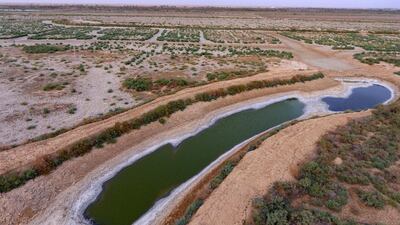The number of Iraqis poisoned by polluted drinking water in Basra is nearing 100,000, with officials failing to tackle a weeks-long crisis in the southern city.
Salt has seeped into the supply, according to residents, making it undrinkable and forcing thousands into hospitals that are now overburdened.
Citizens say the contamination is further proof of the country's collapsing infrastructure, with neglect peaking while politicians in Baghdad squabble over top roles in a new government.
In a statement released on Tuesday, Iraq’s Independent High Commissioner for Human Rights (IHCHR) said 95,000 had been admitted to hospital because of illness contracted from polluted drinking water.
The IHCHR demanded that the central government in Baghdad and the international community "take quick and clear action to tackle the crisis".
"There is no real planning by the government for the recurring water issue," Ali Al Bayati, a board member of the IHCHR told The National. "Currently, there are political tensions in Baghdad causing a struggle between the different partners in the government, resulting in Basra being ignored."
_____________
Read more:
Basra residents accuse Iran-backed militias of intimidation
Water crisis in Iraq's Basra hospitalises football team
_____________
As well as a lack of safe water, Basra and the region surrounding Iraq's main oil city suffers from constant power cuts, a stagnant economy, poor health services, widespread corruption, unemployment and an agriculture sector devastated by drought.
Hospitals are struggling to keep up with the influx of patients.
"More than 95,000 people have been admitted to hospitals in the city during the last month, they have received basic treatment and doctors are saying there is not enough medication to treat a surge in patients," Mohammed Al Tai, a prominent politician from Basra, told The National.
The number is increasing by the hour, Mr Al Tai said, adding that the government has not taken measures to prevent the crisis from escalating.
"The city of Basra is intentionally neglected by the central government, it has four million inhabitants but only has four hospitals. We should have more than 50 hospitals," Mr Al Tai said, referencing international health standards.
Iraqi Prime Minister Haider Al Abadi conceded last week that corruption may have played a part in the southern province's escalating health crisis, and launched an investigation.
Mr Al Abadi said he "asked the Integrity Commission to launch an investigation into the delays that have affected a number of infrastructure projects in Basra and other southern provinces,” referring to the government body tasked with fighting corruption.
“We need to establish if corruption has played a role in the crisis that Basra is currently encountering,” he said.
The prime minister has been criticised for being slow to react to the mounting crisis, though he previously ordered the removal of makeshift dams which impeded water flow to Basra.
In August, Mr Al Abadi suspended the electricity minister and said that his government had begun punishing those responsible for poor services.
Last week, a prominent Baghdad football club cancelled the first match of its season after ten of its players were admitted to hospital.
The Al Hussein team traveled 600 kilometres south to play against Naft Al Junoob in the Iraqi Premier League but, before the match began, much of the team was hospitalised after they were believed to have been poisoned by contaminated water.
No new date has been set for the match and the team remained in Basra because the players were too unwell to travel back to Baghdad.
The pollution of Basra's water supply has added fuel to ongoing protests against poor services.
Hundreds of protesters have previously stoned and tried to break in to the provincial government headquarters to press demands for end pervasive corruption.
The unrest has also spread to attacks on foreign installations including the Iranian consulate which was burned by rioters, and the US consulate which has been targeted by rocket fire.
Mr Al Tai believes that only an uprising bring about changes in the oil-rich province.


